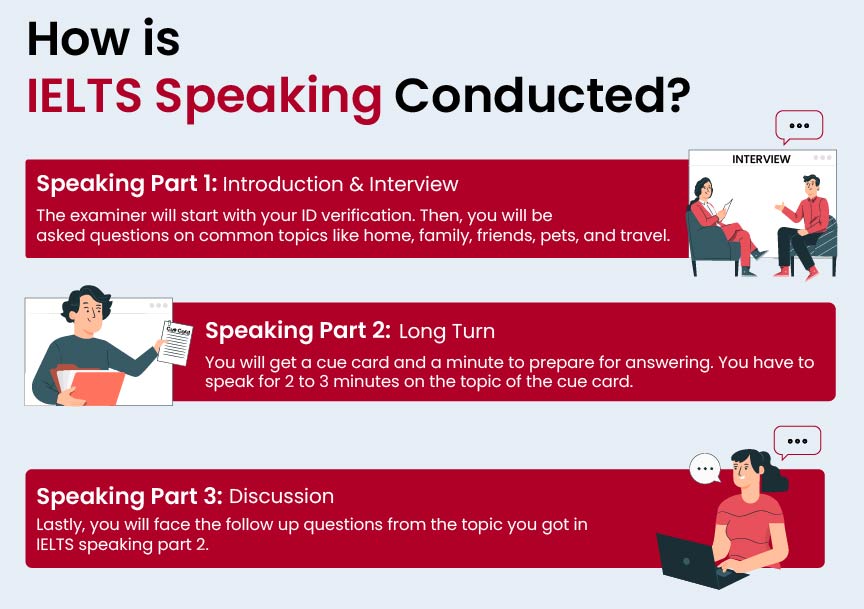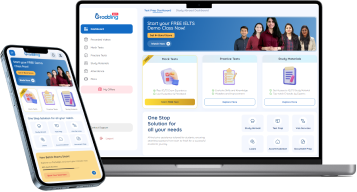IELTS Speaking topics play a crucial role in preparing for the test, as they determine the questions you’ll face in Parts 1, 2, and 3 of the exam. In this blog, we’ll provide you with a comprehensive list of common IELTS Speaking topics and questions, complete with sample answers. Whether you're looking to practice for everyday conversation topics or more complex discussion prompts, this guide will help you feel more confident and ready to tackle the test.

Table of Contents
The IELTS speaking section consists of 3 parts. The IELTS speaking part 1 questions are about your introduction and talking on a basic topic. 2nd part is a long run where you are given a cue card to read and prepare for a minute. Then you have to speak on the speaking IELTS topics you've got. The 3rd part is all about the follow-up questions from the topic you got on the cue card from the last round. Thus, in this round, you will engage in a discussion with the examiner.
The IELTS speaking parts are:
Here is an image to show you how exactly the IELTS speaking part 1, 2 & 3 will be conducted in chronological order:
Now, that you know all about the IELTS speaking section format, let us move on.
The test is divided into three sections—Part 1, Part 2, and Part 3. Each focuses on different aspects of your speaking skills. To help you prepare, we’ve put together a detailed guide featuring IELTS Speaking topics for each part, along with tips on how to approach them.
The IELTS speaking part 1 questions are where you show your ID cards and get them verified by the examiner. They do this to verify that the test taker is the same person who applied for the test. Then, you will shift to an interview on basic topics. Here’s a list of common IELTS Speaking Part 1 topics or questions that you might encounter:
A. Hometown
B. Work
C. Neighbors
D. Hobbies and Interests
E. Friends
These are some of the most common categories that the interviewer can ask questions on. A sample conversation of the same kind for IELTS speaking part 1 questions is given below:
This sample question will be on the topic "chocolate".
Q1. Do you like chocolate?
I love having chocolate after every meal as dessert. It has always been my destressing companion.
Q2. Is chocolate your favorite flavor?
Yes, indeed! I have always chosen chocolate in almost everything over all other flavors. I am fond of dark chocolate more than milk and white chocolate. This was not the case until I was addicted to the sugar in milk chocolate and realized how this much sugar can be harmful. Moreover, it was never sugar that amused me but the aroma of cocoa. I tried quality dark chocolates and instantly became a fan upon reading about their health benefits.
Q3. Is chocolate popular in your country?
Chocolate is now a delicacy offered at important events in my country. For instance, as sweets during a ceremony or festival or as presents and gifts during occasions like Valentine's day.
Q4. Is chocolate good for our health?
Scientifically speaking, sugar does a lot of harm to the body. However, dark chocolate that has more than 75% cacao has been proven to have several health benefits. In addition, this chocolate is more on the bitter side, hence, I am fond of it.
Q5. Do you have a sweet tooth?
I am very fond of sweets and often consume them more than I should. However, I have worked hard and stopped the cravings completely. Moreover, I have shifted towards healthier options now.
This was all about the IELTS speaking part 1. Now, let us talk about the IELTS speaking part 2 questions. The next section will also give you samples to learn from.
The second part of the IELTS speaking section is about cue cards. There are several IELTS speaking topics on the same. This part lasts for 3 to 4 minutes. You get to see a cue card on a topic and then get a minute to think before responding. Furthermore, you then get to speak on the topic. Here’s a list of common IELTS Speaking Part 2 topics that you might encounter during the exam:
A. Describe an unusual holiday you had.
You should say:
B. Describe something that you picked up that you found was thrown by
You should say:
C. Describe a person who is good at making people feel welcome in their
You should say:
D. Describe an exciting activity which you experienced with someone else.
You should say:
E. Describe someone you know who helps others very often.
You should say:
There are several other IELTS speaking topics that you can face in the IELTS speaking questions.
Now, let us look at an example of an IELTS cue card with sample answers.
Here is a sample IELTS cue card to help you understand how to answer one.
A. Describe an occasion when you lost your way.
You should say
I generally don't have a problem with directions. However, I have lost my way quite a few times. I remember this happened recently when my friend was getting engaged and I went to their place to congratulate them. They had recently bought a house after his father's retirement. I had never visited their new home. My plan was to use GPS navigation and reach their place. However, that counts as a mistake now. The newly built suburbs where my friend resides were not updated on the application's data. Thus, the directions lead me to a muddy road in a deserted area of the city. The realization hit me very late as I was trusting this app and the voice navigation blindly.
Furthermore, I kept moving on the same bumpy and muddy road in hope that this might be the correct way. However, it was not too late when I reached the dead end and had to travel all the way back towards the direction I came from. In addition, what stressed me was that I would have to drive over that muddy and rough road again. Before starting this journey I decided to speak to my friend over call and ask him to direct me. His house must be nearby, I assumed.
I discovered that there was no network and started losing hope of being there on time. On top of that, I started fearing what I would do when it got dark. I noticed a few scrap collectors and walked back from the area where I came from. Moreover, they also seemed locals in that area. Thus, I asked them where the newly built suburbs were and which way I needed to go to get out of this predicament. Now, I am not overly reliant on GPS. Moreover, I consider confirming the address before leaving for a place I have never been to.
This was all about the IELTS speaking part 2 questions. You have variations of IELTS speaking questions. Now, let us learn more about IELTS speaking part 3 in the next section.
In Part 3, you will engage in a deeper discussion on abstract topics, often related to the theme of Part 2. This section tests your ability to express and justify opinions, speculate, and discuss topics in more depth. The questions are more complex and require you to provide detailed explanations and examples. Below are the IELTS speaking topics which can help you understand this part better:
A. Family Life
B. Neighbors, Friends, and Community
C. Event in the History of Your Country
D. Time You Spent with a Child
E. Describe A Polite Person
These are the examples of questions you can get in IELTS speaking part 3 questions. Now, let us understand the same with a sample question answer:
A. Describe an Occasion When You Lost Your Way
Follow up questions:
1. Are Young People Better at Orienting Themselves?
Yes, I agree with the statement. I believe that we are overly dependent on technology. In addition to this, many of us don't know how to read a paper map as the requirement to do so has become minimal.
2. What Should People Do When They Get Lost?
Firstly, before looking for a way out of the situation, it is vital to stop panicking. To let your brain function well, you must consider breathing. Next, you should try to contact someone you know. In addition, it would be better if the person you call lives the nearest. If you can't do that, you should take safety measures and wait for an opportunity or seek one depending on the kind of place.
3. Do You Think It is Important to be Able to Read a Map?
Yes, I think it is a vital life skill to be able to read maps of different kinds. There are several public spaces that are huge and are built like a maze. Therefore, more than a GPS, the map on the wall somewhere will be of more help.
4. Why Do Some People Get Lost More Easily Than Others?
Some people are poor with directions. Moreover, many have a condition too where it is a difficult task to remember ways. However, being able to read the maps correctly can be of great help to such people.
5. Some People Deliberately Walk on Unknown Paths without Navigation. Is That a Problem?
I think it is not a problem to explore different regions and travel on paths that are unknown to oneself. However, it can be dangerous to ignore factors like safety and precautions while doing so.
This was all about the three parts of the IELTS speaking section. Now, let us discover how the IELTS speaking section is scored.
The IELTS speaking section is calculated on the basis of the following four points:
These factors are explained below:
This carries 7.5 marks. Your speech must be clear and well structured. What can increase your score keeping this factor in mind is:
This carries 7.0 marks. This counts as vocabulary that you use while giving the answers. You can improve at that by:
This carries 7.0 marks. Try not to fake an accent and stick to one accent. It can also be an Indian accent. However, it must be clear. Thus, you should:
This carries 7.5 marks. Make sure you use correct grammar while speaking fluently. Consider:
The total score for IELTS speaking will be 7.5+7.0+7.0+7.5 / 4
This will be equal to 7.25. The round off of the same will be 7.25.
This is the way your IELTS speaking scores are evaluated. Now, let us know some tips to make it easy for you to score well in the IELTS speaking section.
Read more: IELTS Speaking Band Descriptions
These are some of the most vital advice you will ever get on the IELTS speaking section.
To sum up, the best IELTS speaking topics to practice are the most common things and activities around you. Moreover, you should also practice speaking about them and different matters in English. This will eventually make it easy for you to score well on the IELTS speaking test. Gradding.com has several study plans for different types of learners. Moreover, you can also take their pre IELTS test to know where you stand currently. In addition to this, answers to various speaking topics for IELTS are also some of the many resources you can find on their website.
For this, you will have to focus and practice every section of the IELTS exam well. Moreover, you cannot choose to ignore any of them. Thus, you must practice with a lot of sample papers, mock tests, and IELTS coaching as well if required.
Yes, you can take online IELTS coaching from anywhere with a good internet connection and a laptop or even a smartphone. They can also help you with various IELTS speaking topics to help you get better at it.
You should not do the following:

We are available in :
BangaloreAhmedabadJaipurHyderabadKeralaPuneChandigarhMumbaiGurgaonChennaiKolkataTrivandrumNoidaKochiCalicutKottayamKollamThrissurIndoreUdaipurdisclaimer:logos and other registered trademarks of universities used on this platform are held by their respective owners. Gradding does not claim ownership or association on them, and their use is purely for informational and illustrative purposes.





